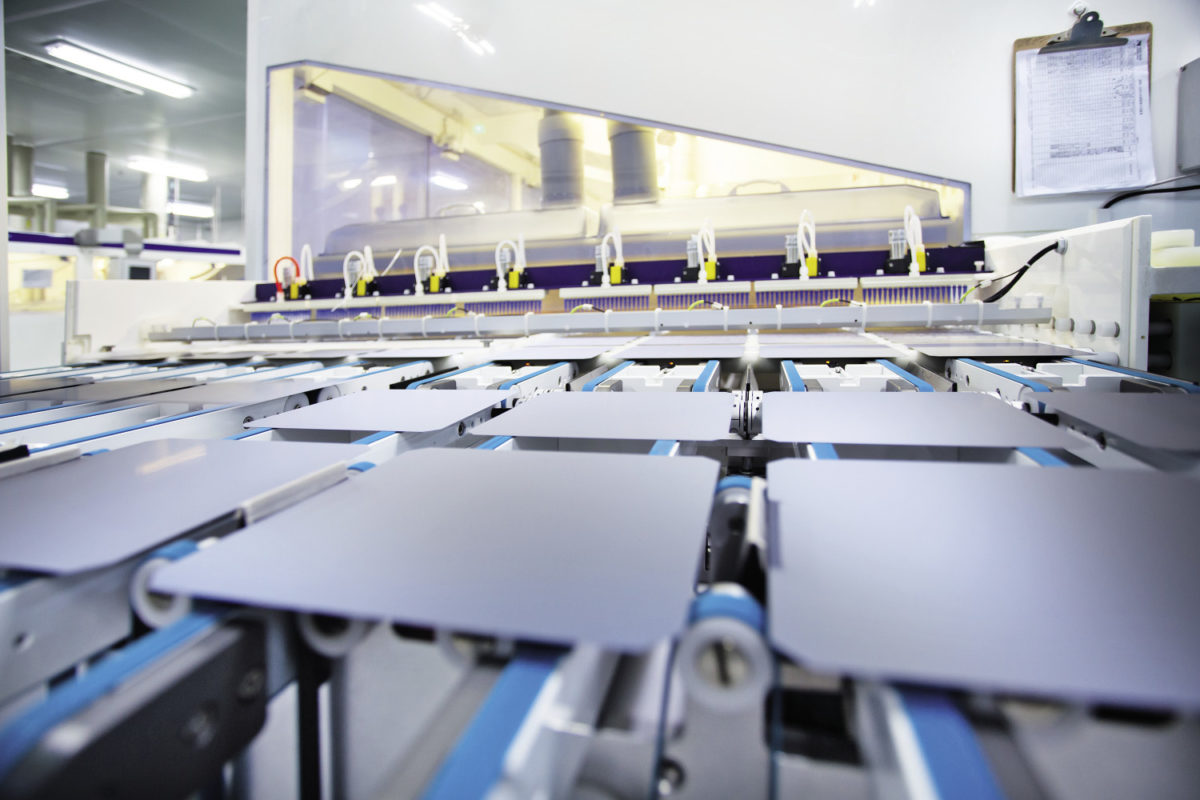Chinese solar module manufacturers JA Solar, Longi and JinkoSolar expect their combined production capacity of PV panels based on 182mm wafers will reach 54 GW in 2021. The announcement was given at the conference Customer Value Focused, Advanced PV Technology for Better LCOE-182mm Module and System Technology, held in Shanghai, which the three companies co-sponsored. The three manufacturers also estimate that in 2021, the production capacity of polysilicon, glass and film for the 182mm products will be more than 50% of the industry’s full capacity, and the proportion of crystal pulling will be as high as 91.7%.
“The 182mm modules effectively support the existing industrial specifications and electrical system,” said Li Shaotang, senior product manager at Longi Solar at the event. “Additionally, in terms of LCOE, 182mm modules are superior to 210mm due to lower system cost, better generation capacity and reliability.” According to JinkoSolar, compared with 210mm modules with the 55P version, 182mm modules can reduce line loss by 0.21% and internal loss by 2%, which represents a reduction in EPC cost by more than RMB0.10/Watt (US$0.015). “On the BOS cost side, the 182mm [format] could provide approximately US$0.026/Watt of savings compared with 210mm,” said Yu Hanbo, senior manager of global products at JinkoSolar, which noted that, by comparing different dimensions of electric cost, BOS cost and IRR, 182mm products are the best choice. “In terms of transportation, compared with 158[mm]/166[mm]products, each container for 182[mm] products can be loaded with about 10% [to around] 20% Watts more,” said Monsoon Wang, senior vice president assistant and senior product technician of JA solar. “More importantly, 182mm products have a number of qualified suppliers in each of the processes, including crystal-pulling, slicing, cell and module manufacturing.”
The GCL New Energy solar project business of polysilicon maker GCL Poly on Monday received a RMB460 million (US$70.2 million) windfall from the state-owned Xuzhou State Investment and Environmental Protection Agency, which will acquire six of its Chinese solar projects with a total generation capacity of 174 MW. GCL New Energy said it would book a RMB9.53 million net loss on the project sale but would bank a net RMB460 million, to be used to pay down debts, and would also remove RMB919 million in liabilities from its books via the transaction. The project company said it would explore the possibility of further sales to the state-owned entity.
Renewables, energy storage and green transportation are among the business areas which will benefit after China’s National Development and Reform Commission (NDRC) last week approved the use of a fresh US$150 million loan from the Asian Development Bank (ADB). A statement from the NDRC indicated “follow-up treatment of coal-to-electricity and coal-to-gas in rural areas” could also benefit. The ADB has previously sanctioned loans of US$300 million in 2015 for policy and regulatory reform in Hebei; €458 million (US$544 million) in 2016 to offer finance to small and medium-sized businesses; and €428 million in 2017 for emission reduction and pollution control, with the finance offered as part of an overall package to improve air quality in Beijing, Tianjin, Hebei, Henan, Shandong, Shanxi, Liaoning and Inner Mongolia. The program, administered by the state-owned China Energy Conservation and Environmental Protection Group, has now been expanded to include Shanghai, Jiangsu, Zhejiang and Anhui.
Popular content
China Glass has announced plans to start producing solar panel-grade ultra-white float glass at its automotive glass production lines in Jiangsu and Shaanxi, to directly supply module makers and to feed the company’s planned ‘solar glass deep processing production line.’ The solar glass project announced by China Glass last month will see the CBMIE Group engineering business equip the solar glass facilities under a RMB50 million (US$7.63 million) contract. CBMIE’s parent company is 42% owned by Triumph Group, which has a 23% shareholding in China Glass.
Hong Kong-listed polysilicon manufacturer Xinte Energy has outlined details of its proposed coal buying program to the end of 2023. Having spent RMB321 million on coal from its TBEA parent company to the end of October, Xinte last month moved to raise the maximum amount it would spend on the fuel this year from RMB300 million to RMB400 million. The company now proposes to spend, subject to a shareholder vote, up to RMB450 million on coal from TBEA subsidiary Xinjiang Tianchi next year, up to RMB480 million in 2022 and up to RMB520 million in 2023. Xinte said Xinjiang Tianchi operates two open coal mines with an annual production capacity of 50 million tons and reserves of more than 12 billion tons.
Solar glass and display company Irico New Energy will hold an extraordinary general meeting on December 28 to vote on a move to consolidate every 20 of its RMB1 (US$0.15) shares into one new RMB1 share, in a bid to attract new investors.
This content is protected by copyright and may not be reused. If you want to cooperate with us and would like to reuse some of our content, please contact: editors@pv-magazine.com.




By submitting this form you agree to pv magazine using your data for the purposes of publishing your comment.
Your personal data will only be disclosed or otherwise transmitted to third parties for the purposes of spam filtering or if this is necessary for technical maintenance of the website. Any other transfer to third parties will not take place unless this is justified on the basis of applicable data protection regulations or if pv magazine is legally obliged to do so.
You may revoke this consent at any time with effect for the future, in which case your personal data will be deleted immediately. Otherwise, your data will be deleted if pv magazine has processed your request or the purpose of data storage is fulfilled.
Further information on data privacy can be found in our Data Protection Policy.